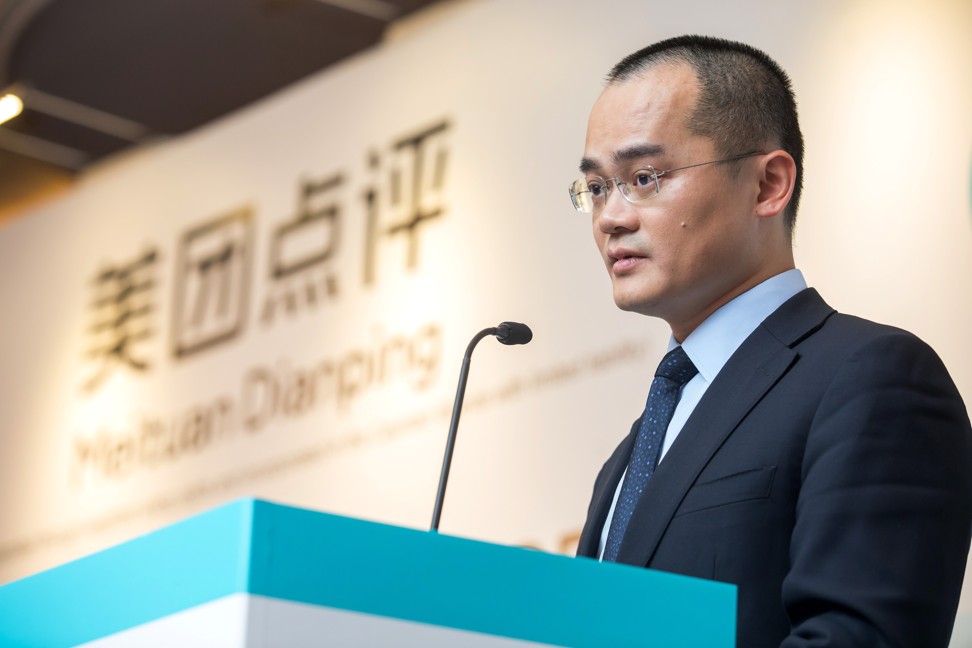
China’s Meituan Dianping narrows losses, pushes forward grocery retail initiatives
- Food delivery services giant posted better-than-expected 70.1 per cent growth in first-quarter revenue to 19.2 billion yuan
Chinese food delivery services giant Meituan Dianping plans to continue its foray into China’s grocery retail sector, despite closing a number of its Ella supermarkets in the first quarter of this year, as it ratchets up competition with Alibaba Group Holding.
Beijing-based Meituan said it was “disciplined on capital allocation for our new initiatives”, according to a regulatory filing in Hong Kong on Thursday when it posted better-than-expected earnings for the quarter ended March.
“With our clear scale and structural advantages in user base, merchant base and delivery network through long-term investments, we have the capability and flexibility to both strengthen our market position and improve our financial performance,” said company co-founder, chairman and chief executive Wang Xing in a statement released after the close of trading.
Meituan narrowed its net loss in the first quarter to 1.4 billion yuan (US$203 million), compared with a 21 billion yuan loss in the same period a year ago, on the back of strong revenue growth across all its major business segments. That was ahead of the 2.7 billion yuan loss projected by analysts surveyed by Bloomberg.

Total revenue in the first quarter grew 70.1 per cent to 19.2 billion yuan, up from 11.3 billion yuan a year earlier, to beat analysts’ 18.3 billion yuan estimate, as Meituan saw a rise in both the number of users and merchants on its platform.
Meituan’s shares, however, were down 5.75 per cent to close at HK$58.15 on Thursday.
“For our food delivery business, our market share continued to increase, while operating results continued to improve in the first quarter,” Wang said.
Revenue from Meituan’s core food delivery business was up 51.7 per cent year on year to 10.7 billion yuan in the first quarter, which is typically a low season for food deliveries across China. The company said its gross transaction volume rose 38.6 per cent to 75.6 billion yuan during the period, when China topped expectations with a 6.4 per cent growth in GDP.
Meituan said its selling and marketing expenses, as a percentage of total revenue, decreased to 19.3 per cent from 25.2 per cent a year ago because of economies of scale, healthy operating leverage and stronger brands.
In the food delivery segment Meituan, backed by Chinese internet giant Tencent Holdings, has been engaged in a costly battle for market share with Alibaba-backed Ele.me. New York-listed Alibaba is the parent company of the South China Morning Post.
“We believe Meituan has gained market share in the first quarter in both gross merchandise volume and merchants,” analysts at Bernstein said in a report last week. “Merchant share gain is more important because it’s the main competitive advantage for Meituan against Ele.me.”
Meituan, which also runs in-store, hotel and travel businesses, reported total active merchants of 5.8 million on its platform in the 12 months ended March.
Meituan’s efforts in the grocery retail sector, however, pale in comparison with Alibaba’s own initiatives. The Hong Kong-traded company said on Thursday that it closed self-operating Ella supermarkets in lower-tier cities in the first quarter because “their returns were below our expectation”.
Meituan said it will focus on improving the shopping experience and operational efficiency in the remaining two Ella stores in Beijing. It has also launched a pilot programme of operating smaller grocery stores in residential communities.
By comparison, Alibaba was operating 135 self-operated Freshippo stores – known as Hema in China – across mainly tier-one and tier-two cities as of March 31, according to the e-commerce giant’s latest quarterly earnings report.
In the first quarter, Meituan said it continued to restructure the overseas bicycle-sharing operations of its Mobike unit, while scaling back subsidies for its car-hailing services.

